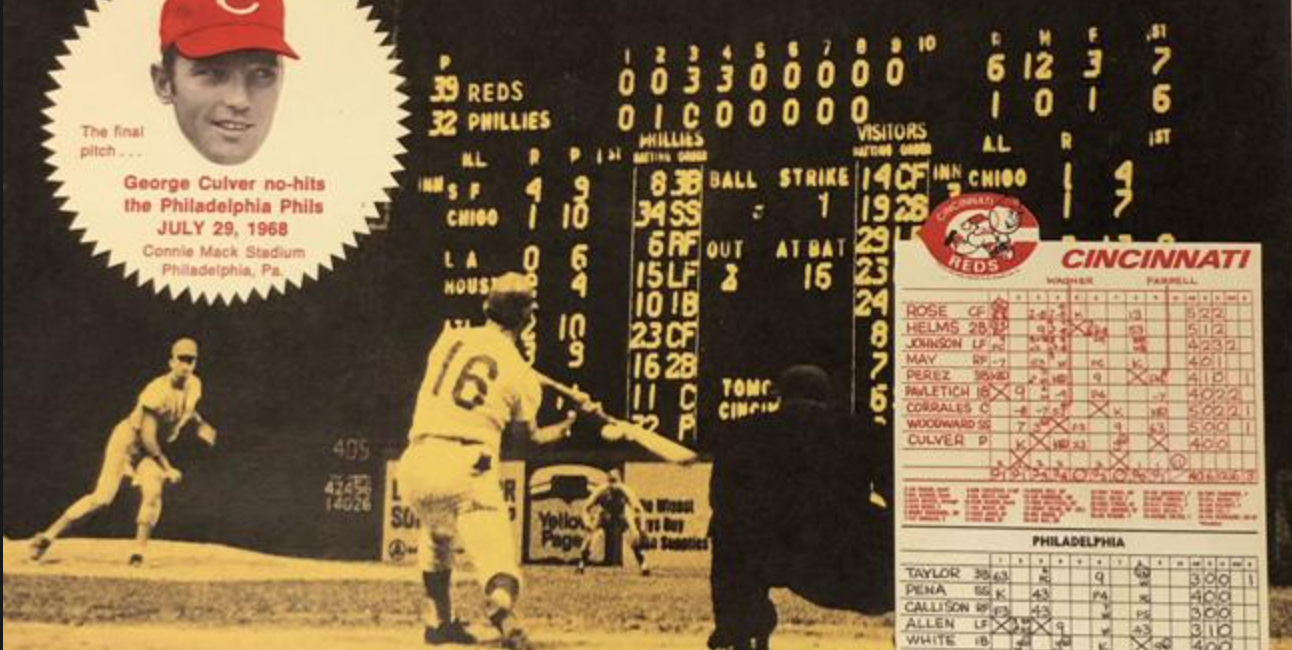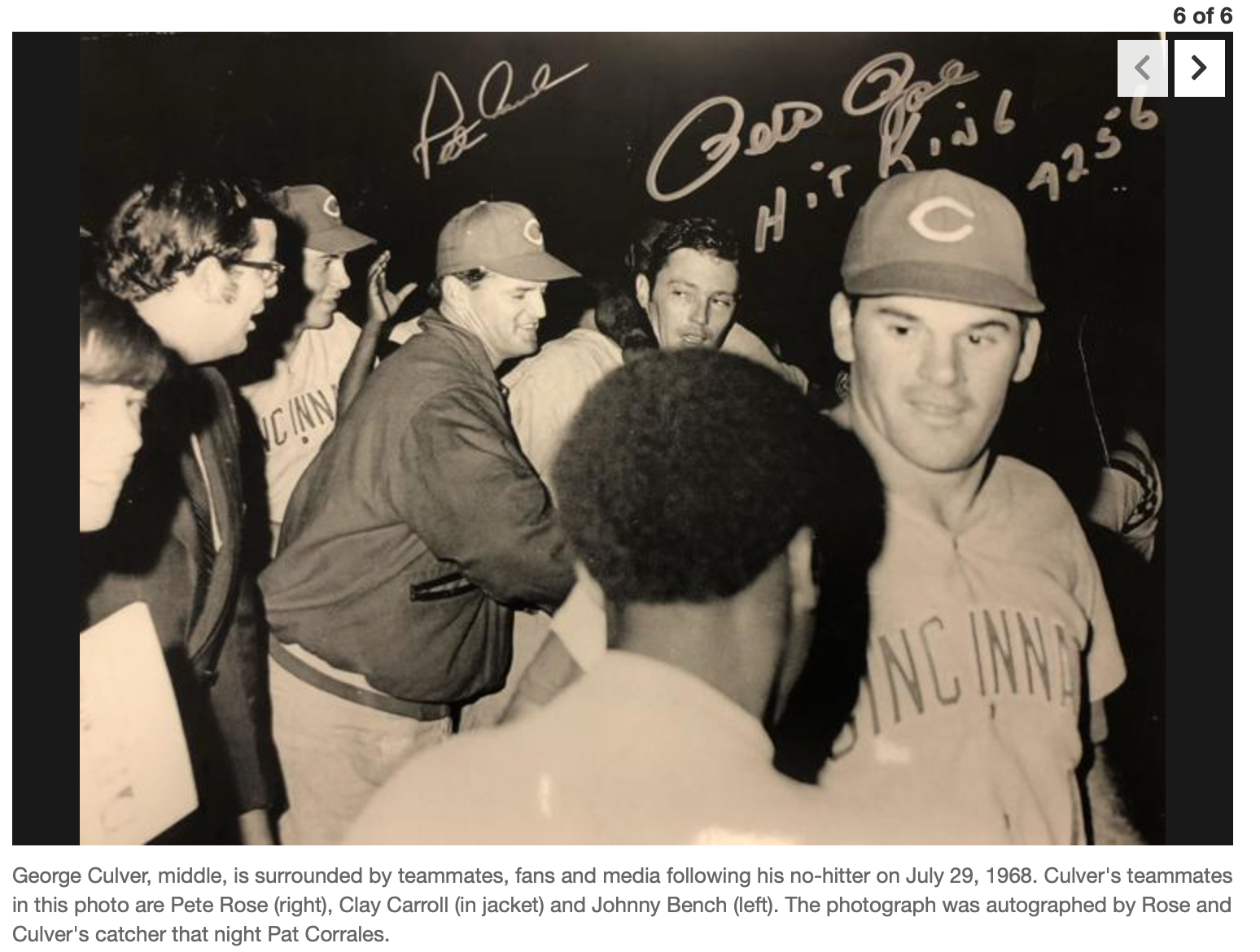On the morning of the most memorable day of his life, George Culver woke up with an upset stomach.
He was too nauseated to eat much. His toe throbbed from an ingrown nail.
He was late getting ready for work — so late he had to hail a cab. So late he didn’t have time to warm up properly.
Then, at 10 p.m., he took the mound for the Cincinnati Reds in the second game of a doubleheader.
And threw a no-hitter.
A gritty, workmanlike, far-less-than perfect no-hitter, but a Hall-of-Fame performance just the same.
Fifty years later he still has vivid memories from that summer evening in Philadelphia.
“Oh yeah, I do,” Culver said, with a head nod and his eyebrows raised. “Pretty clearly, actually.”
The game most certainly had its own wrinkles, quirks and idiosyncrasies.
For starters, Culver’s no-hitter did not result in a shutout. The Cincinnati Reds beat the Philadelphia Phillies 6-1 on July 29, 1968, at Connie Mack Stadium in Philadelphia. Of the 299 no-hitters in MLB history, just 25 saw the team without a hit get in the score column.
Secondly, Culver acknowledged, it likely wouldn’t have happened today.
In all probability, Culver just wouldn’t have completed a game in which he threw well over 100 pitches, surrendered a run, and put the first two hitters of the eighth inning on base with his pitch total climbing.
“They didn’t even count them back then,” Culver said of pitches thrown. “Had to be over 100. If I had to guess, maybe 125.”
In 1968, Culver — a North High and Bakersfield College graduate — threw a career-high 226 innings, which ranked 35th in Major League Baseball that season. For comparison’s sake, last year’s MLB leader in innings pitched was Chris Sale with 214.
Today, a starting pitcher might go five innings before being replaced by a middle reliever, who’s followed by another middle reliever, who’s followed by a setup man. The game is then often finished off by a closer, if all goes according to plan.
“They got a guy for every inning now,” Culver said.
“Nobody is used to pitching that many innings anymore. When I came through high school, college, minors, we pitched nine innings,” he continued. “These guys aren’t trained to throw 100 pitches. ….Medically, they say they’ll blow out.”
Culver said the night of his no-hitter he walked two batters to start the eighth inning before manager Dave Bristol came out for a visit.
“He goes, ‘Do you want to finish this game?’ And I said ‘yeah,’” Culver said. “He said, ‘If anyone else gets on, you’re coming out.’”
Culver said he was nervous in the game’s final stages, but managed to sit the side down in order to finish the ninth.
“It wasn’t something I practiced doing,” Culver said. “I was tense the last couple innings. It’s a once-in-a lifetime shot. You got to make sure you don’t screw it up.”
The lead up, the game, the aftermath
Culver woke up that morning in his hotel room sick to his stomach, he said. He couldn’t eat much of anything.
Because of his condition, Culver didn’t join the Reds for the start of their 6 p.m. doubleheader against the Phillies. Instead, he took a cab to the park for the tail end of the opener, which was high scoring and slow moving. Game 2 didn’t get underway until after 10 p.m., Culver said.
Culver couldn’t warm up immediately because of an ingrown toenail that was giving him fits. Instead, he headed to the clubhouse to get a numbing injection.
When he returned to the field, umpires were exchanging lineup cards — the game was about to begin — and Culver only got about 15 warmup tosses before heading out for the bottom of the first inning.
“I had to take it easy early, because I didn’t want to hurt my arm,” Culver said of not being loose.
After setting down Philadelphia one-two-three in the bottom of the first inning, Culver surrendered a run in the second. Phillies outfielder Dick Allen reached on a fielding error and then advanced to second base on a throwing error. Allen eventually moved to third on a groundout, and scored on a sacrifice fly by Cookie Rojas.
Culver said it was an odd illustration on the scoreboard — the home team was ahead 1-0, yet didn’t have a hit on the stat line.
“I was wondering if anyone had ever pitched a no-hitter and lost,” Culver quipped.
The Reds scored three runs apiece in the third and fourth innings, however. Culver would walk five batters and strike out four to finish the deal.
Immediately following, the team celebrated on the field and then took it inside the clubhouse while Culver stayed outside for a radio interview. By the time he returned to the locker room, all the beer was consumed.


